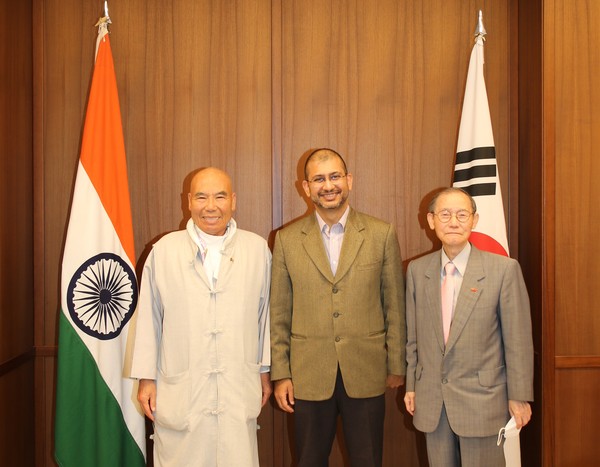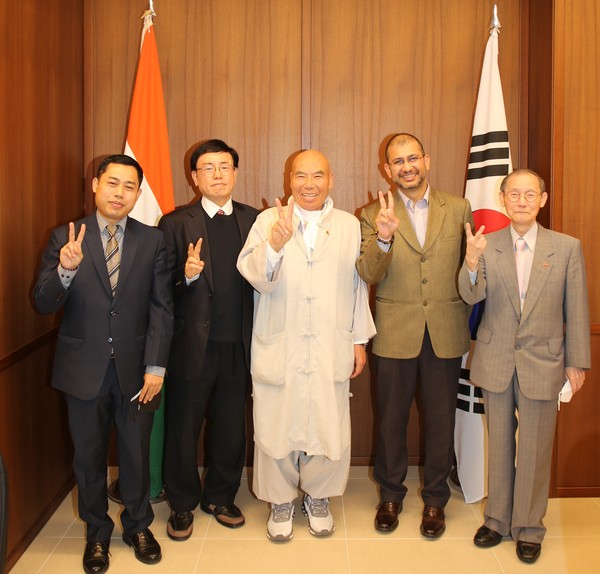Relations forged through marriage between Indian princess, Korean king
By Publisher Lee Kyung-sik with Editor Kevin Lee, Feature Editor Yeu Min-yul
The Embassy of India in Seoul is in really good hands!
This was the impression the visitors from The Korea Post media got when they visited the Embassy of India in Seoul on October 14 this year and had a brief meeting at the Embassy with Deputy Chief of Mission Mr. Surinder Bhagat and Second Secretary Mr. Kriti Das Thokchom. (Ambassador Shri Amit Kumar was on a visit to India at the time.)
The meeting was for the Embassy of India and Venerable Chief Abbot Hyangdeok Park Seung-eok of the Cheonman-sa Buddhist Temple in Ulsan who was visiting India where he is scheduled to attend important religious meetings and promote relations between Korea and India.

Chief Abbot Hyangdeok is a very diplomat-friendly person and takes special interest in promoting relations with all the countries of the world represented by their ambassadors in the Republic of Korea.
India is a very, very special country to Korea—and vice versa. And this relationship in the past was strengthened through Buddhism and the Royalties between the two counties, especially Queen Heo Hwang-ok of India (Korean name) during the 32-189 AD period of Korea. The Queen of India came to Korea and married King Kim Suro of the Gaya Kingdom. So, from the ancient times Korea and India are ‘brother’ countries.
According to sources at the Korean Ministry of Foreign Affairs, the Korean government continues to try expand and deepen the Korea-India Special Strategic Partnership.
Korea’s efforts are also geared towards ensuring the growth of the Korean corporations in India by enhancing mutual understanding, trust and friendship between our two peoples.
Korea-India bilateral relationship boasts of longstanding historical and cultural ties, spanning over two millennia as shown above.
Korea and India forged diplomatic relations in 1973, paving the way for a sound and steady development in bilateral relations across a wide range of areas, including politics, economy and culture.
The signing of the Korea-India Special Strategic partnership in 2015 and the launch of New Southern Policy by the Korean government in 2017, a policy that was in synchronization with the Prime Minister Narendra Modi government’s Act East Policy, which has led to a turnaround in the Korea-India relations.
The State Visit of President Moon Jae-in to India in July 2018 and that of Prime Minister Narendra Modi to Korea in February 2019 have further taken the bilateral ties and friendship between the two countries to a new high.
As a newly emerging power, India holds vast potential and opportunities for bilateral cooperation. Nearly 700 Korean companies, both big and small, have entered the Indian market and increased their investment.

With K-Pop and other Korean Wave contents gaining popularity among the Indian youth, interest of Indian people in Korean culture and language is steadily growing. In milestone developments, Korean history was included in the Indian school text-books in 2018 and Korean language was offered as a foreign language in Indian secondary schools in 2020.
Around 10,000 Koreans are known to be living in India and they serve as the backbone of strong bilateral relationship.
The bilateral relations and cooperation particularly stand out in the economic area. According to the Embassy of India in Seoul, the trade and economic relations between India and Korea have gathered momentum in recent years with annual bilateral trade reaching US$23.7 billion in 2021 (as per data from Korea International Trade Association), highest ever bilateral trade figure till now.
The bilateral Comprehensive Economic Cooperation Agreement (CEPA), set in place since 2010, has spurred the trade and investments both ways. In 2021, Korea’s investment to India recorded US$218 million. Korea’s total FDI to India from 1980 up to December 2021 stands at US$7.27 billion. Investments from India to Korea are to the tune of approx. US$3 billion led by Tata Daewoo, Ssangyong and Novelis.
Bilateral economic ties received a visible boost from the visit of Prime Minister Narendra Modi to the Republic of Korea from 18-19 May 2015.
Overview:
The trade and economic relations between India and Republic of Korea (Korea) have gathered momentum in recent years with annual bilateral trade reaching US$23.7 billion in 2021 (as per data from Korea International Trade Association), highest ever bilateral trade figure till now.
The two countries decided to commence negotiations to amend the CEPA, strengthen cooperation on energy, electronics and shipbuilding industries, including setting up of a Joint Working Group for Cooperation on the Shipbuilding sector and another in the field of Electronics Hardware manufacturing.
Korea offered to provide US$10 billion financing (development assistance and concessional credit) to India for infrastructure projects. Recognizing the importance of the shipping industry in the bilateral relationship, the PM also visited the Shipyard of Hyundai Heavy Industries in Ulsan.
Leaders of the two countries addressed the inaugural session of bilateral CEOs Forum to promote bilateral economic cooperation, while the PM Modi also met the leadership of the top Korean conglomerates. ‘Korea Plus’ desk was created as a single window in India to address all the issues raised by Korean companies as a result of the PM’s visit.
State visit of President Moon Jae-in during 10-12 July, 2018 to India has boosted bilateral engagement with a joint vision of people, peace and prosperity. A target of bilateral trade worth $ 50 billion to be achieved by 2030 was set up by Prime Minister Modi and President Moon during this visit.
To further strengthen bilateral ties, Prime Minister Narendra Modi visited Korea during on Feb. 21-22, 2019 and held a series of bilateral and business engagements. Prime Minister Modi unveiled a bust of Mahatma Gandhi at prestigious Yonsei University to commemorate 150th birth anniversary of Mahatma Gandhi during this visit and also accepted the Seoul Peace Prize conferred upon him by Seoul Peace Prize Foundation.

